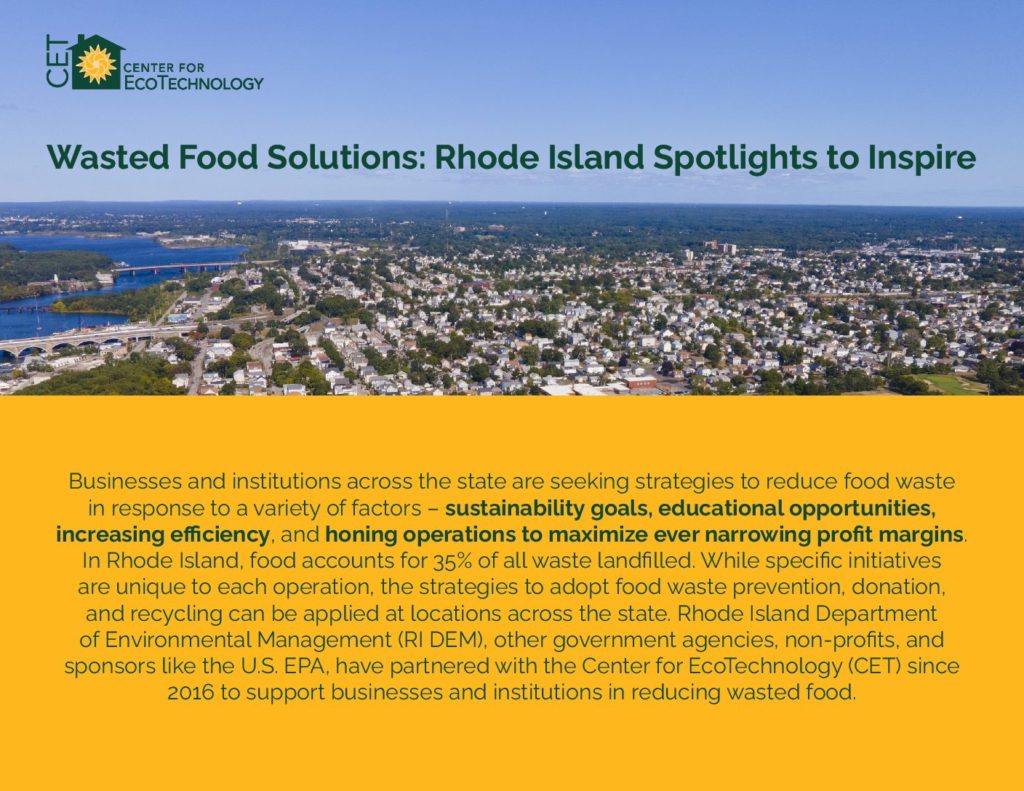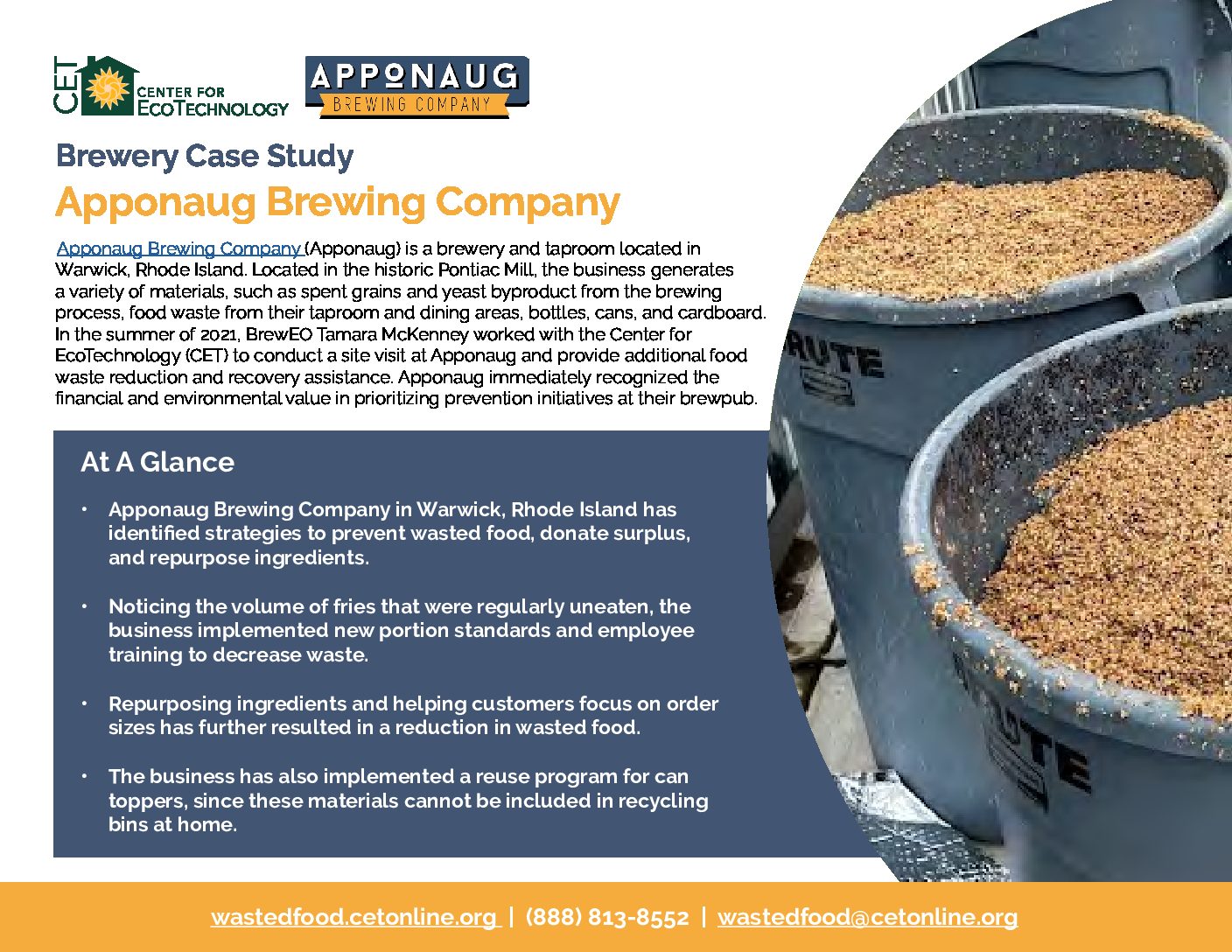
CET has helped many businesses and institutions in Rhode Island learn more about food recovery and wasted food diversion opportunities. When it comes to preventing and diverting a wide range of materials from disposal, we can offer no-cost support! We help a range of businesses, from those that are just getting started to those who want to take their existing efforts to the next level.
Call: 888-813-8552 | E-mail: wastedfood@cetonline.org
The Center for EcoTechnology (CET) helps Rhode Island businesses and institutions divert wasted food and supports the growth of the service providers marketplace. CET builds awareness of the RI Food Waste Recycling Law and partners with service providers such as Phood to support their source reduction technologies in dining halls across the state. These efforts and others are in partnership with Rhode Island Department of Environmental Management, Rhode Island Department of Health, Rhode Island Resource Recovery Corporation, and the Director of Food Strategy to support the goals of the Relish Rhody plan to reduce wasted food.
Helpful Rhode Island Wasted Food Resources
- Anaerobic Digestion Overview
-
Intended for the Rhode Island Schools Recycling Club, CET created an overview of the Anaerobic Digestion process.
-
- CET report on the state of the food recovery marketplace in Rhode Island
- Report produced by CET in 2017 outlining existing successes, challenges to overcome, and opportunities to make a significant impact in the state.
-
- Spotlights from Providence
- Food makes up 35% of all waste landfilled in Rhode Island. Prevention, donation, and recycling are integral to improving public health and achieving climate action goals. Learn how RI businesses and institutions are working together to reduce wasted food & how to join!
- Spotlights from Rhode Island Social Media Toolkit
This Social Media Toolkit has pre-written posts and suggested hashtags for you to easily be able to share these success stories on your organization’s social media platforms.
- Spotlights from Providence
- Food strategy report: Relish Rhody
- Report on Rhode Island’s food system produced in 2017. The Relish Rhody report includes a section on minimizing and diverting wasted food.
- Food Waste Reduction Toolkit for Rhode Island Schools
- As part of the Get Food Smart, Rhode Island partnership, Rhode Island DEM and Rhode Island Schools Recycling Club developed this toolkit with resources and tips for Rhode Island schools to reduce their food waste. It includes case studies and guidance for measuring, preventing, and redistributing surplus food, as well as ways to engage the school community in creating your solutions.
- Solid Waste 2038 comprehensive plan for Rhode Island
- The solid waste management plan developed by the Rhode Island Division of Planning describes existing practices, programs, and activities in all major solid waste management areas, and recommendations specific to each. One of the Plan’s elements is supporting food waste diversion in the commercial sector through policies, regulations, and statutes that encourage development of private processing facilities.
- Rhode Island Department of Environmental Management Green Certification Programs
- Voluntary programs developed to assist businesses across various categories to become sustainable and to continuously improve their pollution prevention performance.
- Guidance about food scrap composting on-site
- Information and printable Do-It-Yourself tip sheet from the Rhode Island Resource Recovery Corporation (RIRRC) about composting food waste on-site at schools, businesses, and homes. RIRRC also provides no-cost technical assistance to Rhode Island businesses and institutions with recycling and composting programs.
- Food Safety Standard for Rhode Island Community Food Bank
- Guidance on safe food storage, food handling, soliciting donations, receiving donations, handling food recalls, and record-keeping for Rhode Island Community Food Bank member agencies.
- Rhode to End Hunger: Donate Surplus Food From Your Business
- The Rhode to End Hunger, an initiative of the Rhode Island Department of Health (RI DOH), partnered with MEANS Database, to help get unused, edible food to organizations that can use it. Johnson & Wales University, Relish Rhody, RI DOH, EPA, and Rhode Island Hospitality Association collaborated to create a tip sheet for donating food in Rhode Island.
- Food Rescue & Redistribution in Rhode Island – Visit this form to learn about becoming a food donor, nonprofit food recipient, or Food Rescuer with both Rescuing Leftover Cuisine and Means Database.
- Share Table and Food Donation Guidance for Rhode Island Schools
- foodSCAPE created a guidance document for Rhode Island schools on the donation of surplus food, including external donations to nonprofit organizations and internal donations through share tables. This document was developed with the support of the RI Department of Education, RI Department of Health, and the USDA.
- Hope’s Harvest Resource for Gleaning
- Resource for Rhode Island farmers, volunteers, and hunger relief agencies to become involved in farm-based food recovery, or gleaning.
Read
We hope you are as inspired by these stories as we are and will share them on your social media accounts!
Watch
CET partnered with the University of Rhode Island to create and broadcast a webinar focused on the business case for reducing, rescuing, and recycling wasted food. Check it out!
Rhode Island Legal/Regulatory Requirements
- Every state has specific state-level legal and regulatory requirements regarding food waste and food donation. ReFED, a national food waste prevention nonprofit, created a searchable database of state-by-state food waste policies and regulations, in collaboration with the Harvard Food Law and Policy Clinic. View the Rhode Island food waste policy page for specific, up-to-date information about Rhode Island’s food waste laws.
- The Emerson Act
- The Federal Emerson Act (Public Law 104-210) protects donors from liability when donating to nonprofit organizations and protects donors from civil and criminal liability should the product, donated in good faith, later cause harm to the needy recipient.
- Helpful fact sheets on food donation laws from Harvard Food Law and Policy Clinic
In the Press:
-
Restaurant-Centered Series Speaks on Reducing Food Waste to Benefit Environment – Rhode Island Monthly
-
URI’s food recovery program reduces food waste, improves food access for Rhode Islanders – The University of Rhode Island News
-
URI launches community education effort to address food waste and access issues – The University of Rhode Island News

